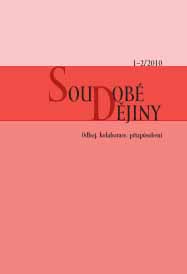Partyzánský oddíl Olga Krvavá cesta jedné odbojové skupiny
The ‘Olga’ Partisan Unit: The Bloody Trail of One Resistance Group
Author(s): Vladimír ČernýSubject(s): History
Published by: AV ČR - Akademie věd České republiky - Ústav pro soudobé dějiny
Summary/Abstract: This article discusses the Olga partisan unit, which is written into the history of the resistance in the Protectorate of Bohemia and Moravia because of its important operations, but whose reputation was tarnished by wanton acts of violence carried out on the orders of its commander, Josef Houfek. The Olga group was established by Houfek, together with Olga Františáková, in central Moravia in January 1945. The author describes the founding and development of the group, and seeks to demonstrate, among other things, that Houfek’s decision to join the partisans was based not so much on patriotism as a desire to stand out and to seek adventure; this twenty-three-year old butcher’s apprentice had, moreover, previously been convicted of petty theft and had served in both the Wehrmacht and the Protectorate police. The author describes a number of clashes between partisans of the Olga group and German units, focusing on two operations that gained them considerable recognition. In the fi rst, the partisans managed, on 26 February 1945, to dump more than half a million litres of fuel and motor oil from Wehrmacht wagons at a railway station in the village of Morkovice, in the Zlín region of Moravia. On 19 April 1945, shortly before the end of the war, at the manor house in Hoštice near Kroměříž, they captured the commander of the 16th Panzer Division of the Wehrmacht, Generalmajor Dietrich von Müller, which was an absolutely unique act in the history of the partisan movement in the Bohemian Lands. The author, however, also considers cases where the partisan commander ordered the execution of several fellow-partisans and others who were accused, without good reason, of collaboration or whom he felt, for one reason or another, were in his way. For these excesses he was arrested after the war and put on trial twice, but was given only a light sentence. Using hitherto neglected archives the author has also verifi ed a number of pieces of questionable information, which had accumulated during the years when the partisan unit was operating. This includes, in particular, Františáková’s having allegedly spied for the Gestapo, which turned out to be an unfounded claim. The author also notes an incident in the village of Střílky (near Kroměříž) just after the war, in which three alleged collaborators were executed under the direction of members of the Olga unit; this incident later became a point of contention between a leading Czech poet, František Halas, and a major literary historian, Václav Černý. In conclusion, the author briefl y discusses the post-war lives of some members of the Olga unit, and attempts an overall assessment of their activity in the context of the resistance.
Journal: Soudobé Dějiny
- Issue Year: XVII/2010
- Issue No: 01-02
- Page Range: 31-81
- Page Count: 51
- Language: Czech

